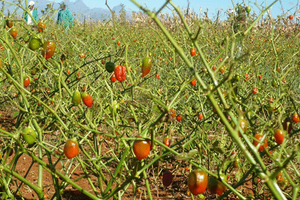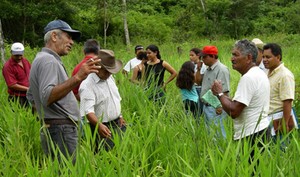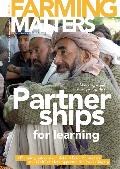AUTHOR
December 2010
Articles
 Locally rooted: Ideas and initiatives from the field
December 22nd, 2010
Locally rooted: Ideas and initiatives from the field
December 22nd, 2010
Working together brings many benefits, especially in terms of new ideas. These are some of the many examples where collaboration, in different parts of the world, is enhancing learning. Uganda: Learning around online repositories Open to all organisations and individuals interested in sharing agricultural knowledge, experiences and information, the Uganda Exchange Group started at the … Read more
Learning for change
December 22nd, 2010
Editorial – Kanthamma, a widow of approximately 70 years old, used to collect ladybird beetles from neighbouring fields and release them in her own: “These insects help me keep the aphids in my cotton crop under control. My neighbours did not believe me that it worked, so they did not mind me ‘stealing’ the beetles … Read more
 Theme overview: Partnerships for learning
December 22nd, 2010
Theme overview: Partnerships for learning
December 22nd, 2010
Mobilising our greatest resource for continuity and change: People The establishment of strong and efficient partnerships can contribute enormously to family farming, in many different ways. All efforts to enhance learning, however, must ensure that local people remain in control of the process. External agents need to be very aware of the role they want … Read more
Nutrition from innovation and taste from waste
December 22nd, 2010
From a situation of widespread undernutrition, consuming fresh vegetables all year round has now become a reality for many Nepali households thanks to their expanding home gardens. But the stories they tell show that the benefits of home gardens are not limited to improving household nutrition. The gardens also help to empower women and conserve … Read more
 Exceeding expectations
December 22nd, 2010
Exceeding expectations
December 22nd, 2010
Partnerships and scaling up in Central America. The “Degraded Pastures” project in Central America has had an impact that has extended far beyond the duration and scope of the project. This is because the joint learning process that it established motivated the participants to continue working together, and also motivated other organisations, both public and … Read more
Opinion: The Economist is wrong
December 22nd, 2010
A couple of months ago, The Economist published a long article praising Brazilian agriculture, something that led to outbursts of patriotism, and to Brazilians expressing pride on their “success”. But how successful is this model so generously praised? Francisco Caporal argues that The Economist is wrong. On closer examination, this article seems to have been … Read more
 Farmers & markets: IIED’s Knowledge Programme
December 22nd, 2010
Farmers & markets: IIED’s Knowledge Programme
December 22nd, 2010
Interview > Bill Vorley – Small-scale farmers are being urged into international markets as a way out of poverty – and they need to be able to protect their interests and make effective choices. “We see agency as the capacity of small-scale producers to make effective choices that advance their interests, and to act on … Read more
Two views: Can family farmers benefit from bio-fuels?
December 22nd, 2010
With the world’s reserves of oil going down, governments and companies have started looking for alternatives. A global market for bio-fuels has been developing during the past ten years, which was one of the factors that contributed to the sharp increase in food prices in 2008. Since then, the cultivation of crops for bio-fuels, such … Read more
Learning about … Multi-stakeholder processes
December 22nd, 2010
Getting people who have polarised views to sit together, listen to and learn from one another is a major challenge. Take the palm oil industry, for example. A product of the humid tropics, palm oil is currently the most important and versatile vegetable oil on the world market and demand keeps increasing. However, the growth … Read more
Farmer Field Schools take root in Egypt
December 22nd, 2010
Update from the field – Previous articles in this magazine have reported on the Fayoum Farmer Field School (FFS) project in Egypt. In March 2003, Jaap van der Pol showed how the Asian FFS-model needed adaptation in Egypt as local extensionists were used to working with individual farmers (not with groups) and to discussing rather … Read more
December 2010
 Locally rooted: Ideas and initiatives from the field
Locally rooted: Ideas and initiatives from the field
Working together brings many benefits, especially in terms of new ideas. These are some of the many examples where collaboration, in different parts of the world, is enhancing learning. Uganda: Learning around online repositories Open to all organisations and individuals interested in sharing agricultural knowledge, experiences and information, the Uganda Exchange Group started at the … Read more
Editorial – Kanthamma, a widow of approximately 70 years old, used to collect ladybird beetles from neighbouring fields and release them in her own: “These insects help me keep the aphids in my cotton crop under control. My neighbours did not believe me that it worked, so they did not mind me ‘stealing’ the beetles … Read more
 Theme overview: Partnerships for learning
Theme overview: Partnerships for learning
Mobilising our greatest resource for continuity and change: People The establishment of strong and efficient partnerships can contribute enormously to family farming, in many different ways. All efforts to enhance learning, however, must ensure that local people remain in control of the process. External agents need to be very aware of the role they want … Read more
From a situation of widespread undernutrition, consuming fresh vegetables all year round has now become a reality for many Nepali households thanks to their expanding home gardens. But the stories they tell show that the benefits of home gardens are not limited to improving household nutrition. The gardens also help to empower women and conserve … Read more
 Exceeding expectations
Exceeding expectations
Partnerships and scaling up in Central America. The “Degraded Pastures” project in Central America has had an impact that has extended far beyond the duration and scope of the project. This is because the joint learning process that it established motivated the participants to continue working together, and also motivated other organisations, both public and … Read more
A couple of months ago, The Economist published a long article praising Brazilian agriculture, something that led to outbursts of patriotism, and to Brazilians expressing pride on their “success”. But how successful is this model so generously praised? Francisco Caporal argues that The Economist is wrong. On closer examination, this article seems to have been … Read more
 Farmers & markets: IIED’s Knowledge Programme
Farmers & markets: IIED’s Knowledge Programme
Interview > Bill Vorley – Small-scale farmers are being urged into international markets as a way out of poverty – and they need to be able to protect their interests and make effective choices. “We see agency as the capacity of small-scale producers to make effective choices that advance their interests, and to act on … Read more
With the world’s reserves of oil going down, governments and companies have started looking for alternatives. A global market for bio-fuels has been developing during the past ten years, which was one of the factors that contributed to the sharp increase in food prices in 2008. Since then, the cultivation of crops for bio-fuels, such … Read more
Getting people who have polarised views to sit together, listen to and learn from one another is a major challenge. Take the palm oil industry, for example. A product of the humid tropics, palm oil is currently the most important and versatile vegetable oil on the world market and demand keeps increasing. However, the growth … Read more
Update from the field – Previous articles in this magazine have reported on the Fayoum Farmer Field School (FFS) project in Egypt. In March 2003, Jaap van der Pol showed how the Asian FFS-model needed adaptation in Egypt as local extensionists were used to working with individual farmers (not with groups) and to discussing rather … Read more

